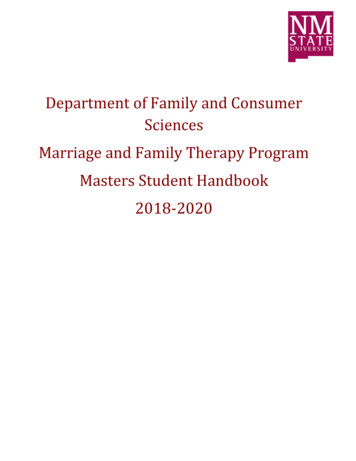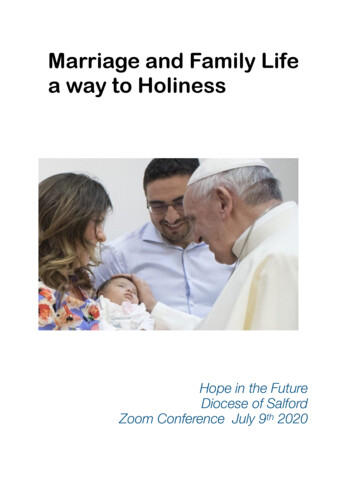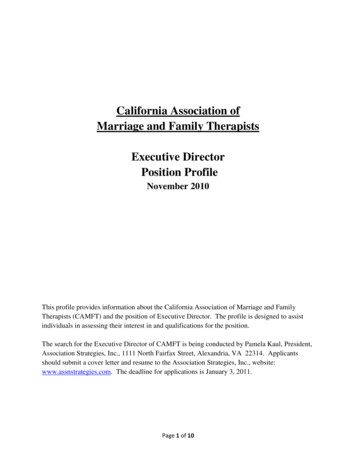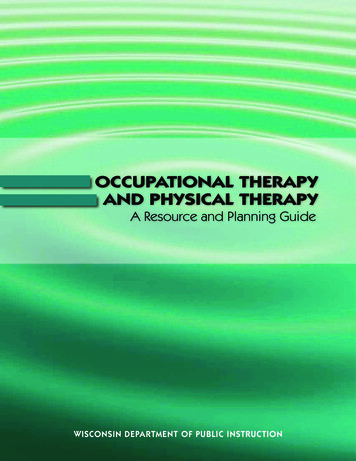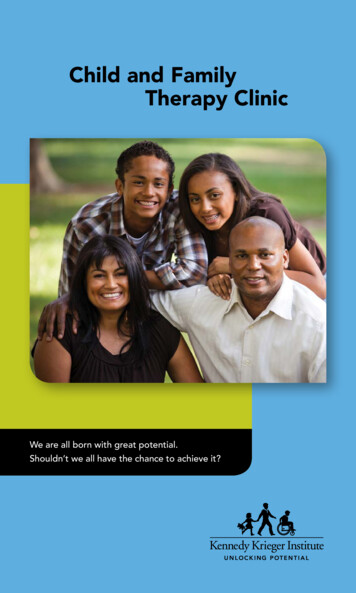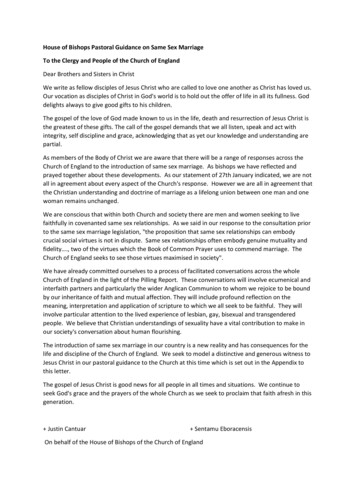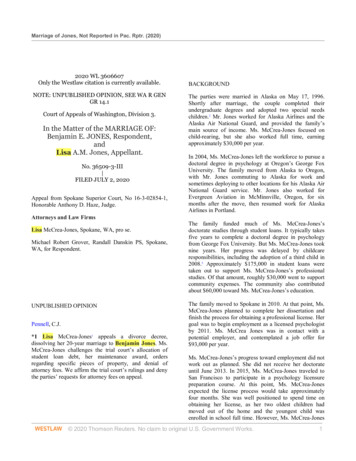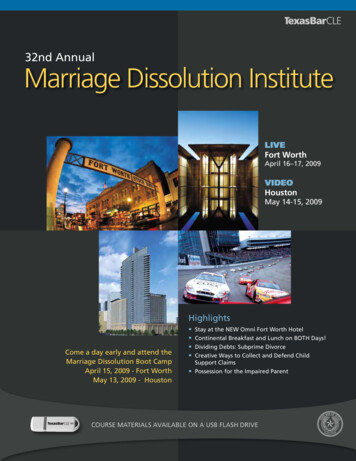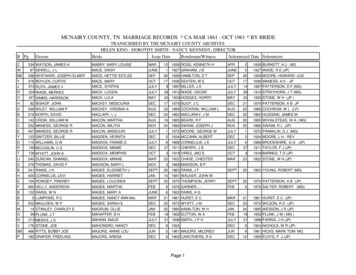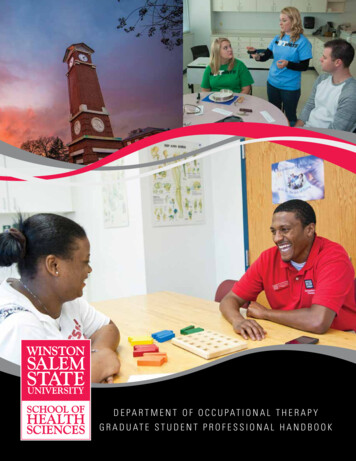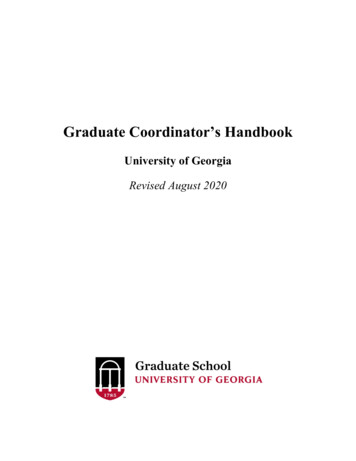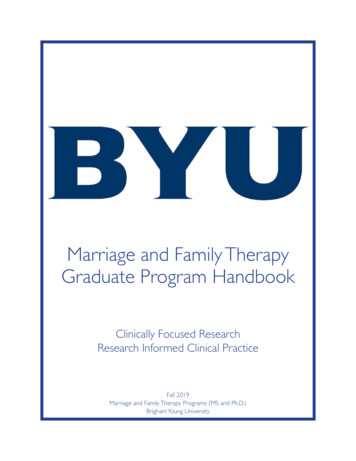
Transcription
Marriage and Family TherapyGraduate Program HandbookClinically Focused ResearchResearch Informed Clinical PracticeFall 2019Marriage and Family Therapy Programs (MS and Ph.D.)Brigham Young University
Welcome to the Marriage and Family Therapy ProgramWelcome to one of the premier Marriage and Family Therapy (MFT) graduate programs in the United States!You have been selected by the faculty with great care and with the expectation that you will progress through theprogram to completion. We welcome you as students, friends, and colleagues to join us in the development ofour profession!The MFT Program at BYU began in 1967 and is among one of the first universities in the United States totrain marriage and family therapists. Utah passed legislation to license MFTs in 1971, making it among one of thefirst states to do so. Currently, we are one of the few universities offering both the masters and doctoral degreesin MFT. BYU MFT graduates are in clinical and academic positions throughout the United States, Canada, andthe world.While here, you will gain the knowledge and skills necessary to enter your field of study and future professionwith confidence. This Graduate Program Handbook has been developed to assist you as you begin and progressthrough your studies. Specifically, this Handbook has the following goals: To describe MFT Graduate Program policies and procedures To provide you with a clear understanding of the educational outcomes associated with your program To help you understand the expectations and procedures related to the academic curriculum To help you understand the resources available to you at BYU including faculty, staff, library, computerresources, financial aid, etc.We wish you the best and look forward to your participation in and contribution to the Marriage and FamilyTherapy Program at Brigham Young University.Jason WhitingProfessor and Program DirectorMFT Programs (MS and Ph.D.)jason.whiting@byu.edu264 TLRB801-422-0163Every effort is made to provide accurate and current information in this handbook, the MFT Program reservesthe right to change statements in the handbook concerning polices, curricula, or other matters. This officiallyoccurs on an annual basis, but may occur at other times as well. Students enrolled in the MFT Program agree tocomply with the Program’s rules and regulations and to accommodate to any changes necessary.If you have recommendations for making the handbook more clear or accurate, please email them to DuncanCole duncan cole@byu.edu or MFT sectaries mftptsec@byu.edu.Updated 07.01.192 MFT Handbook 2019
Table of Contents8Frequently Asked Questions9Chapter 1: Introduction10 The People of the MFT Program13 Advisory Chair23Directors and Staff14Student Association14MFT Program Missions and Educational Outcomes14Master’s Program Mission and Details19Ph.D. Program Mission and DetailsChapter 2: Getting Started273036411323Getting Started at BYU25Getting Started in MFT Classes26 Academic ResourcesGraduate Studies and Financial AidBYU and MFT Program Expectations30MFT Dress and Grooming Standards30Ecclesiastical Endorsements31MFT Academic Policy33Graduate Studies Academic Policies33Coursework Expectations35Evaluation Outcomes:35Corrective Actions36Role of MFT Faculty in Program Governance37Role of Program Director in Program Governance38Role of Students in Program Governance40Role of Other Communities of Interest in Program GovernanceMFT Program GovernanceChapter 3: Comprehensive Clinic4142Clinic Student Trainees Contractual AgreementImportant Places in the Clinic and WhyTable of Contents 3
43Client Management System (CMS)43Case Management Guidelines46 Adding Clients to Case47Case Transfer Guidelines48 Terminating a Case4851Use of Cell PhonesChapter 4: Master’s Degree Overview51 Academic and Coursework Information56586061626352Prior to Starting the Program52Selecting a Track: Thesis vs. Non-Thesis52Graduation Requirements58Instructions to Complete the FormForming Your Graduate CommitteeProgram of StudySample Program of Study for Master’s Degree StudentsMaster’s Degree Clinical TimelineClinical Experience and Practicum InformationChapter 5: Doctoral Overview63 Academic and Coursework Information68707276767880828364Coursework Requirements for all Doctoral Students (minimum 69 credits)65Graduation Requirements65Post-Master’s Ph.D. Course Sequencing70Instructions for Completing Program of Study Form73Doctoral Program of Study (ADV Form 3) HelpForming your Graduate CommitteeProgram of StudyProgram of Study FormClinical Experience and Practicum InformationDoctoral Portfolio GuidelinesDoctoral Portfolio ChecklistProfessional Development Internship RequirementsProfessional Development Internship Plan and Evaluation FormChapter 6: Policies and Procedures83Policies Regarding Conduct83BYU Honor Code4 MFT Handbook 2019
83Plagiarism83Preventing Sexual Harassment83Students with Disabilities84 Title IX Policy84858790919284Non-Discrimination Statement85Conference Attendance Overview85Conference Attendance for Master's Students86Conference Attendance for Ph.D. StudentsPolicy for Determining Sufficient Number of FacultyPolicies Regarding Travel and Confernce Attendance86 Travel Support for Students Attending ConferencesStudent Travel Authorization Form88Other Funding Options88Procedure for Getting Funds90 Adjunct Benefits and TravelPolicies Regarding Professional Experiences90Student Initiated Off-Campus Clinical Experiences91Regarding Work Outside of the Clinic Prior to Graduation91Professional Liability Insurance91Use of MFT Interns’ Office91MFT Office Procedures (234 TLRB)Policies Regarding MFT SpacesPolicies Regarding Thesis Proposal and Defense Meetings92 Thesis Proposal and Defense Meetings94Graduate Studies Policy Requiring Attendance at Defense Meetings95 Appendix A: Admissions Guidelines97 Appendix B: MFT Student Standards99 Appendix C: Professional Development99 Becoming Licensed in the State of Utah99 Professional Organizations100 A Career as a University Professor103 Appendix D: Beginning Practicum Forms104105106Log of Observational Hours for Beginning PracticumEvaluation of Case Conceptualization Paper: Beginning PracticumFeedback & Grading Criteria for Taped Demo of Basic SkillsTable of Contents 5
107 Appendix E: Practicum Forms108 Client Logs109 Clinical Competence Evaluation Form110 Semester Clinical Experience Summary111 Student Evaluation of Supervision113 Verification of Clinical Hours: Ph.D. Level114 Verification of Clinical Hours: Master’s Level115 Appendix F: Program Evaluation Forms116 Theoretical Competence Evaluation Form117 Research Competence Evaluation Form118 Cross-Cultural Inventory119 Appendix G: Intern- & Externship120121Doctoral Internship ProposalExternship Proposal122 Appendix H: Curriculum Comparison123 Appendix I: Sample Thesis Format126 Appendix J: Sample Dissertation Format129 Appendix K : Clinical Services Forms130134Clinical Services FormsGoogle Voice Contact Form135 Appendix L: Employer Satisfaction137 Appendix M: Alumni Survey139 Appendix N: Student Achievement Data141 Appendix O: Program Demographics142 Appendix P: Handbook Updates6 MFT Handbook 2019
Table of Forms60Sample Program of Study for Master’s Degree Students72Program of Study Form78Doctoral Portfolio Checklist82Professional Development Internship Plan and Evaluation Form87Student Travel Authorization Form104Log of Observational Hours for Beginning Practicum105Evaluation of Case Conceptualization Paper: Beginning Practicum106Feedback & Grading Criteria for Taped Demo of Basic Skills108Client Logs109Clinical Competence Evaluation Form110Semester Clinical Experience Summary111Student Evaluation of Supervision113 Verification of Clinical Hours: Ph.D. Level114 Verification of Clinical Hours: Master’s Level116 Theoretical Competence Evaluation Form117Research Competence Evaluation Form118Cross-Cultural Inventory120Doctoral Internship Proposal121Externship Proposal130Clinical Services Forms134Google Voice Contact FormTable of Forms 7
Frequently Asked Questions11—What are the faculty research interests?12—Other than faculty, are there other people I should know?14—Who are the student representatives and what do they do?23—How do I get started?26—Where can I go for personal counseling?26—Where can I find library and writing resources on campus?27—What financial assistance is available?30—Is there a dress code?34—As a doctoral student, what are the time constraints to complete my degree?34—How will my progress be evaluated?35—What happens if I receive a poor evaluation?38—As a student, what is my role in the MFT program?52—As a master's student, are their time constrains on completing my degree?56—As a master's student, how do I form my graduate committee?58—As a master's student, when is my Program of Study due?68—As a doctoral student, how will I form my graduate committee?70—As a doctoral student, when is my Program of Study due?76—What is the doctoral portfolio?86—Are there funds available for me to attend a conference?99—What professional organizations should I join?102—What resourses are available if I am experiencing a financial crisis?8 MFT Handbook 2019
Chapter 1: IntroductionThe mission of Brigham Young University—founded,supported, and guided by The Church of JesusChrist of Latter-day Saints—is to assist individuals intheir quest for perfection and eternal life. That assistance should provide a period of intensive learning ina stimulating setting where a commitment to excellence is expected and the full realization of humanpotential is pursued.Master’s Program The Marriage and FamilyTherapy MS Program at Brigham Young University was first accredited in 1967 by the Commissionon Accreditation for Marriage and Family TherapyEducation (COAMFTE, which is AAMFT’s accrediting body). The MFT Program has been continuously accredited since that time, most recently in2016. The mission of the BYU MFT Master’s Program is to educate marriage and family therapiststo advance a relational perspective on the practiceand science of improving the health and well-being of individuals, couples, families, and society. Inthe program, students will be instructed and challenged to develop competency in the areas of theory,clinical practice, and research. To aid developmentof these competencies, the program is committedto providing opportunities in clinical, academic,and research arenas. This is done in an environment that is committed to respect and support ofmulticulturalism and diversity.Ph.D. Program. The Marriage and FamilyTherapy Ph.D. Program at Brigham Young University was first accredited in 1967 by the Commissionon Accreditation for Marriage and Family TherapyEducation (COAMFTE, which is AAMFT’s accrediting body). The MFT Program has been continuously accredited since that time, most recently in2016. The mission of the BYU MFT Ph.D. Programis to educate marriage and family therapy scholarsto advance a relational perspective on the scienceand practice of improving the health and well-beingof individuals, couples, families, and society. Inthe program, students will be instructed and challenged to develop competency in the areas of theorydevelopment, teaching/supervision, and research.To aid development of these competencies, the program is committed to providing opportunities inclinical, academic, and research arenas. This is donein an environment that is committed to respect andsupport of multiculturalism and diversity. BYUoffers three options for the Ph.D. degree in MFT, asfollows: Students with a baccalaureate degree must firstcomplete the MS program curriculum (thesis in cluded), which takes two years. After completingthe MS degree, they may apply to the Ph.D. program. Upon admission to the doctoral program, the student completes the Ph.D. programrequirements, which take an additional fouryears. Admission to BYU's Ph.D. program is notguaranteed simply upon completion of the MSprogram. Students who have a clinical but non-MFTmasters degree program (e.g., MSW) shouldapply to the Ph.D. program. However, themaster’s curriculum is followed until MFT MSdegree courses not present in a student’s previous clinical program have been completed.When all requirements for licensure in MFTare completed, the student then begins thePh.D. curriculum. Students who already have an MFT masterdegree from an accredited MFT program mayapply for the Ph.D. program. They could complete the program in approximately four years.This chapter will introduce the people involved inmaking the Program work and an overview of themission and details of the MFT Program.Chapter 1: Introduction 9
The People of the MFT ProgramShayne R. Anderson, Ph.D. University of Georgia, 2007, Associate ProfessorResearch Interests: Impact of model-independentfactors on therapy process and outcome; high-conflictco-parenting, and measurement issues in MFTAlyssa Banford-Witting, Ph.D. Texas Tech University, 2011, Associate ProfessorResearch Interests: Trauma and culture; masstrauma in communities and families; natural disasterand war; MFT process research on trauma treatmentLauren A. Barnes, Ph.D. Brigham Young University, 2013,Assistant Professor and Director of Clinical TrainingResearch Interests: Systemic influences on bodyimage and eating disorders, marital division of laborRoy A. Bean, Ph.D. Brigham Young University, 1997, Associate ProfessorResearch Interests: Parent-adolescent relationshipsin ethnically diverse families;culturally competenttherapy for Hispanics/Latinos.Angela B. Bradford, Ph.D. Auburn University, 2012, Assistant ProfessorResearch Interests: Predictors and mechanisms (i.e.,mediators and moderators) of change in primary andsecondary couple interventions.10 MFT Handbook 2019
Anthony Hughes, Ph.D. Brigham Young University, 2013, Visiting FacultyResearch Interests: Sex therapy; sexual development;wellness through mindfulness, emotional regulation,and exercise; attacements in couple relationships; andnarrative shifts in person, couple, and sexuality.Quintin Hunt, Ph.D. University of Minnesota, 2018, Associate ProfessorResearch Interests: Youth and families at risk of suicide (primary sexual and gender minorities and suicidebereaved), family therapy process and interventionresearch.Lee N. Johnson, Ph.D. Kansas State University, 1998, ProfessorResearch Interests: The effects of physical activity,improved sleep, and reduced stress on emotional regulation and marriage and family therapy outcomes; thetherapy alliance; MFT process and outcome research.Jason B. Whiting, Ph.D. Michigan State University, 2001,Professor and Program DirectorResearch Interests: Couple conflict- includingabuse, control, and deception; mindfulness, wellness,theory, and qualitative inquiry.Kayla Mennenga, Ph.D. Brigham Young University, 2015, Visiting FacultyResearch Interests: Predictors of emotion regulation in couple interactions; mindfulness and coupleinteractions.i What are the facultyresearch interests?Chapter 1: Introduction 11
Important People and Places Directoryi Other than faculty, are there other people I should know?School of Family Life (SFL) Director:Alan Hawkins, Ph.D.2086-B JFSB801-422-7088alan hawkins@byu.eduMFT Program Director:SFL Office Manager:MFT Clinical Director:Jan Christensen2086-E JFSB801-422-9094jan christensen@byu.eduSFL Graduate Program Manager:Terri Robertson2086-F JFSB801-422-2060terri robertson@byu.eduBYU Comprehensive Clinic Director:Dean E. Barley, Ph.D.237 TLRB801-422-7818dean barley@byu.eduBYU Comprehensive Clinic Assistant Director:David Fawcett, Ph.D.162 TNRB801-422-7749dave fawcett@byu.eduBYU Comprehensive Clinic Secretaries:241 TLRB801-422-3989clinic-pt-sec@byu.eduFHSS Research Support Center:116 SWKT801-422-5114fhssresearch@gmail.com12 MFT Handbook 2019Jason Whiting, Ph.D.264 TLRB801-422-0163jason whiting@byu.eduLauren Barnes, Ph.D.274 TLRB801-422-3889lauren barnes@byu.eduMFT Secretaries:234 TLRB801-422-5680mftptsec@byu.eduMFT Accreditation Manager:Duncan Cole247 TLRBduncan cole@byu.eduMFT Ph.D. Student Association Contact:Alexis Werneralexis werner@URMC.Rochester.eduMFT MS Student Association Contact:Javier Celestinofrancisco.j.celestino@gmail.comFHSS Writing Lab:1049 JFSB801-422-4454fhss-writinglab@byu.eduFamily Life and Sociology Librarian:Quinn Galbraith801-422-4482quinn galbraith@byu.edu
Advisory ChairWhen students are admitted to the program, theyare assigned an advisory chair for their graduatecommittee. This MFT faculty member is the student’s major advisor and thesis/dissertation/clinical project mentor. It is most helpful to students ifmeetings between a student and his/her advisorychair occur regularly, even weekly. Meeting regularly facilitates consistent review of the student’sprogress in the program. Scheduling these meetings is usually initiated by the student. We recommend the student contacts their advisor withinthe first week of Fall Semester to set up a meetingschedule. The advisory chair will advise the studentabout course work and consult with the student indesigning and carrying out his/her thesis, dissertation, or clinical project including length of paper.Topics worthy of regular review with an advisorychair include: Class schedules and academic progress Progress towards completion of clinical andsupervision hours Progress towards completion of thesis, dissertation, or clinical project and doctoral portfolio Progress on timeline towards completion ofdegree Additional topics of pertinence to the student oradvisory chairStudents should keep their advisory chair informedabout their professional goals and unique needs thatare or are not being met in the program, and professional activities. Students have the primary responsibility for developing their Program of Study and fordesigning the thesis, dissertation, or clinical project.A student’s advisory chair (along with other faculty)is a significant resource in finding opportunities forprofessional involvement. Professional involvementincludes: presenting papers at professional meetings, acquiring student officer positions in professional associations, and having a variety of teaching,research, and intervention experiences.The advisory chair can assist students in findingtheir first professional position upon graduation.This involves writing letters of recommendation,being alert for the type of positions for which thestudent would be suited, and making personal contacts where appropriate.Directors and StaffProgram Director (Jason Whiting, Ph.D.) Theprogram director provides curriculum oversight,ensures adherence to COAMFTE guidelines, coordinates scholarships and research/teaching assistantship (RA/TA) contracts, and manages theday-to-day operations of the MFT program (e.g.,faculty and student concerns).Director of Clinical Training (LaurenA. Barnes, Ph.D.) Also known as the clinical director, works to recruit new students, oversees admission to the program and assists current students intheir clinical training by assigning, networking andincreasing potential clinical opportunities. TheDirector of Clinical Training is the liaison to theBYU Comprehensive Clinic and directs the casemanagement system by screening and assigningappropriate clients to the students in the program.The MFT Office The MFT office staffed by parttime secretaries is located in room 234 TLRB. Parttime secretaries are available to answer questionsstudents might have or direct them to the appropriate person. They are the department secretaries and not your personal secretaries. While theycan answer questions for you, they are not to runerrands or copies for you. They cannot print offanything but forms and items on approved letterhead. Students need to inform the secretaries aboutchanges to their mailing address, email address ortelephone number.Graduate Program Manager (Terri Robertson) The School of Family Life (SFL) Graduate ProgramManager is Terri Robertson, and her main officeis 2086F JFSB. She is responsible for tra
years. Admission to BYU's Ph.D. program is not guaranteed simply upon completion of the MS program. Students who have a clinical but non-MFT masters degree program (e.g., MSW) should apply to the Ph.D. program. Ho
